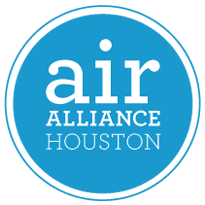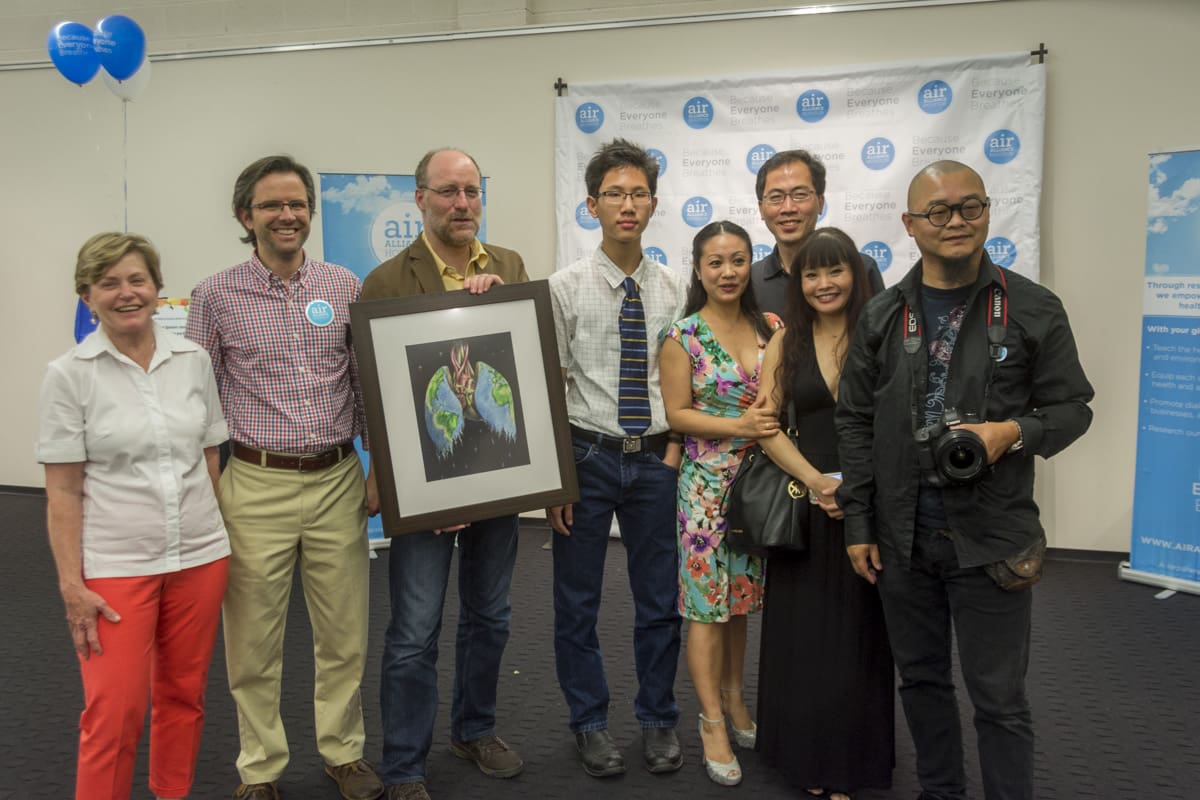Our Campaigns
We recognize that Houston’s metropolitan area is a place of diversity where each community faces different challenges. Our campaigns take into consideration the various air quality issues and environmental injustices in neighborhoods, focusing on advocating with underserved communities who experience disproportionate and cumulative impacts from multiple sources of air pollution (Ethylene Oxide, Particulate Matter 2.5, Benzene, etc.). Read how we are prioritizing better air quality for Houston communities.
Our campaigns are chosen based on our strategic plan for 2025-2030.
Building Healthy Communities
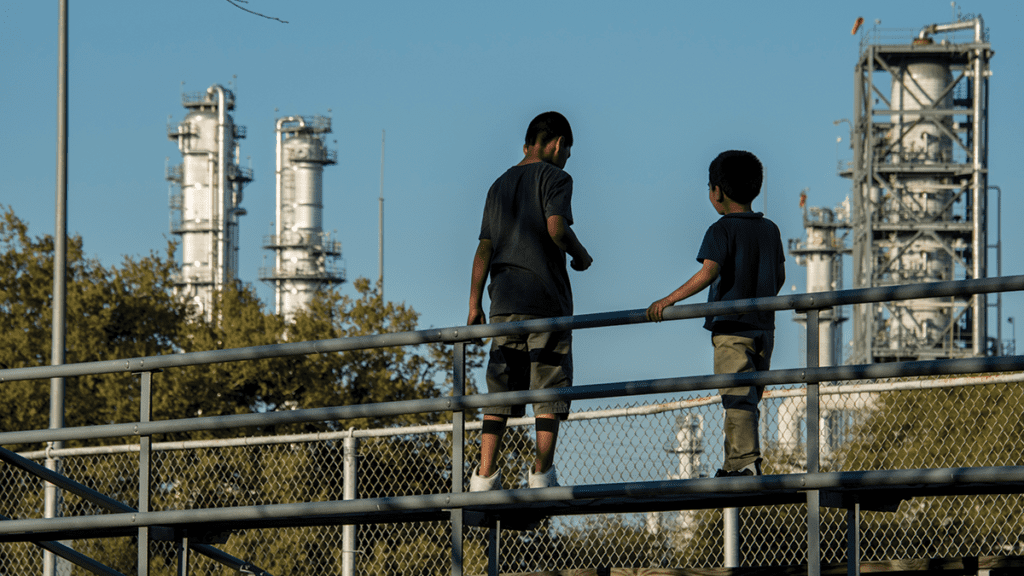
Clean Air for Port Communities
As a member of the Healthy Port Communities Coalition (HPCC), we advocate in partnership with residents for the health and well-being of communities impacted by Port operations along the Houston Ship Channel. We work to increase transparency and community participation in the Port’s decision-making processes and advocate for equity and quantifiable emissions reductions in the Port’s planning. In addition, we advocate limiting community impacts from the Ship Channel Expansion (‘Project 11’) by calling for the use of cleaner dredge equipment and responsible placement of dredge materials. Read more about our Coalition’s Strategic Priorities here.
Widening and Deepening of the Houston Ship Channel: Air Quality & Health Impacts, an executive summary
Houston Advanced Research Center (HARC) & Texas A&M University. Report commissioned by Public Citizen in association with HPCC, 2021
Evaluation of the air quality impacts of clean combustion technologies, emissions controls and fleet electrification in the Houston Metropolitan Area for the year 2040
Report released by the University of Houston in conjunction with Public Citizen and the Healthy Port Communities Coalition assessing future models for emission control, 2018
More resources available at: healthyportcommunities.org/resources/
Industrial Emissions Regulation and Enforcement
Strong accountability of polluters begins with strong air quality standards and their enforcement. We routinely respond in writing, with testimony, and in our calls to action to proposed air quality-related permits, regulations, rules for implementation, enforcement patterns, and determinations of adherence that are developed by both the local Texas regulator (TCEQ) and the U.S.Environmental Protection Agency (EPA). Strong enforcement of the Clean Air Act (CAA) and of the National Ambient Air Quality Standards (NAAQS) is always a high priority. Our efforts address both ‘backyard polluters’ like concrete batch plants, landfills, or metal recyclers and larger fossil fuel facilities, both of which are overconcentrated in Houston communities of color and lower-income neighborhoods.
Public Comments Re: United States v. TPC Group LLC, D.J. Ref. No. 90-5-2-1-12550 – July 1, 2024
Comments on the TCEQ Public Participation and Language Access Plan – March 17, 2022
Comments on the TCEQ Sunset Review – January 3, 2022
AAH signs on to a letter to the Chemical Safety Board, calling for reforms – July 8, 2021
AAH’s supporting testimony on HB 2974 to the Environmental Regulation Committee during the 87th Texas Legislative Session – April 26, 2021 (written) | Watch the live recording
Supporting Sustainable & Equitable Transportation
The Houston region faces many challenges regarding transportation and the health of its residents that will likely worsen if appropriate actions are not taken. Houston’s particulate matter and smog levels remain unhealthy, and vehicle traffic is a significant contributor to Houston’s stubborn air pollution problem as well as a significant source of climate-changing greenhouse gas emissions.

Opposition to I-45 and Other Highway Expansions
We apply our research and community advocacy methods to address a network of highway expansions, which, allowed to advance unabated, will further encroach on Houston communities, force more capacity for Single Occupant Vehicle (SOV) trips, and worsen our air quality. We work alongside Houstonians to advocate for true community engagement in each these projects popping up across the region, including:
- I-45 Expansion, also known as the North Houston Highway Improvement Project (NHHIP)
- Hardy Downtown Connector
- I-10 W west of downtown
- I-45 S from Downtown to Beltway 8
- I-45 N in Montgomery County
- 610 and SH 225 in Pasadena, among others.
NHHIP Air Monitoring Analysis_ November 2024
NHHIP Air Monitoring Data – Analysis – February 2024
I-45 Voluntary Resolution Agreement (I-45 VRA) Progress Report: Summary and Analysis – December 2023
Our Health Impact Assessment of the NHHIP:
Air Alliance Houston: Health Impact Assessment of the North Houston Highway Improvement Project
Air Alliance Houston: Health Assessment of The Bruce Elementary School Community – Final Report
Air Alliance Houston: I-45 N Expansion Health Impact Assessment – Summary of Key Findings
Air Alliance Houston: I-45 N Expansion Health Impact Assessment – Concerns, Impacts, Possible Solutions
Air Alliance Houston: North Houston Highway Improvement Project (NHHIP) Health Impact Assessment – 3rd Ward/Midtown/Museum District Recommendations
Air Alliance Houston: North Houston Highway Improvement Project (NHHIP) Health Impact Assessment – 5th Ward Recommendations
Air Alliance Houston: North Houston Highway Improvement Project (NHHIP) Health Impact Assessment – Greater Northside/Northline Recommendations
Air Alliance Houston: Proyecto del Mejoramiento de la Autopista del Norte de Houston y Evaluación del Impacto en la Salud (NHHIP por sus siglas en Inglés) – Recomendaciones para Greater Northside/Northline
Air Alliance Houston: North Houston Highway Improvement Project (NHHIP) Health Impact Assessment – Aldine/Greenspoint Recommendations
Air Alliance Houston: Proyecto del Mejoramiento de la Autopista del Norte de Houston y Evaluación del Impacto en la Salud (NHHIP por sus siglas en Inglés) – Recomendaciones para Aldine/Greenspoint
City of Houston documentation:
City of Houston’s interactive map about the project’s impacts
From our partners:
Make I-45 Better Coalition – documents
AAH public comments to the Harris County Commissioners Court RE: Hardy Downtown Connector project – December 19, 2023
AAH Statement on the City and County NHHIP MOUs with TxDOT – Full Analysis – December 22, 2022
AAH Comments on the Final Environmental Impact Statement (FEIS) for the NHHIP – December, 7, 2020
Clean and Just Transportation Planning
We focus on building broad public support for an equitable multi-modal transportation system that promotes alternative transportation modes, reduces vehicle miles traveled, increases fleet electrification, and ensures everyone can get where they need to go.
We conduct research and support plans and initiatives to improve multi-modal transportation options both within the city and in the wider Houston region. These include the Houston Bike Plan, Houston’s METRO bus and light rail system, H-GAC’s High Capacity Transit Task Force, and Houston BCycle.
In addition to supporting individual projects, we advocate for structural funding redistributions and project reprioritization at the local, regional, and state level to better support an accessible, sustainable transportation infrastructure system.
We also support equitable and sustainable land use policies in Houston and the greater region to combat sprawl, reduce car dependency, prevent displacement, and ensure people at all income levels have access to a multimodal transportation system.
Power, planning, and avenues for change: Uncovering levels of power within Metropolitan Planning Organizations to encounter avenues for the achievement of urban environmental justice
Masters Thesis by Lia Miller, Air Alliance Houston Summer Intern, 2022. Thesis supported by Air Alliance Houston.
COVID and Public Transit in the Houston Region
Air Alliance Houston, in partnership with LINK Houston & Texas Southern University, 2021
Air Alliance Houston Public Comment: I-10 from Heights Blvd. to I-45 – August 11, 2022
Air Alliance Houston Public Comment: Gulf Freeway PEL Study – July 29, 2022
AAH’s supporting testimony on HJR 109 to the Transportation Committee during the 87th Texas Legislative Session – April 20, 2021 (written) | Watch the live recording
Equitable Goods Movement
According to H-GAC’s Regional Goods Movement Plan, the Houston region expects to see twice as much freight volume moving through our region by 2050, including freight rail. We support and uplift directly impacted communities who are already experiencing disproportionate impacts of freight. We hold rail companies and all levels of government accountable to address the mobility and public health impacts brought by freight rail.
Protecting Against Chemical Disasters
Major chemical incidents are far too frequent in the Houston area, putting the health and well-being of residents at risk. Communities of color and with lower income are particularly vulnerable as hazardous facilities are disproportionately concentrated in these neighborhoods.
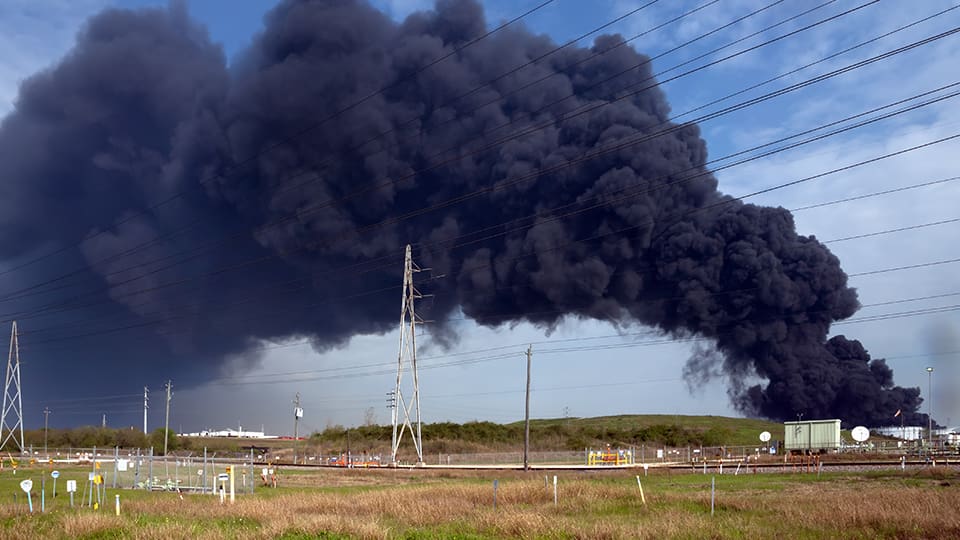
Disaster Prevention and Community Notification
We work in partnership with groups such as the Coalition to Prevent Chemical Disasters to strengthen federal rules and local practices to prevent chemical disasters from happening in the first place. The EPA’s Risk Management Plan Rule or RMP is a key lever in this work as it outlines requirements for chemical-producing facilities for the prevention and mitigation of risks that could lead to a disaster.
In addition, as time is of essence when a chemical disaster happens, we advocate for the implementation of a toxic chemical alert system that would rapidly notify communities about threats to their health and safety during chemical disasters, such as what already exists for severe weather or missing people. Such a system was first proposed to lawmakers in 2017; however, the bill was unsuccessful. We also work with local emergency preparedness groups and entities to improve regional responses to disasters. One example is Project BREATH where we assist County departments and offices in developing a more efficient communications system to support emergency response to chemical incidents.
Reduce Industrial Flaring
We work toward strengthening federal rules and local practices to reduce the public health impacts of industrial flaring while raising community awareness about the harmful effects of flaring and how residents can help push for policy change and greater industry oversight.
Monitoring Our Air
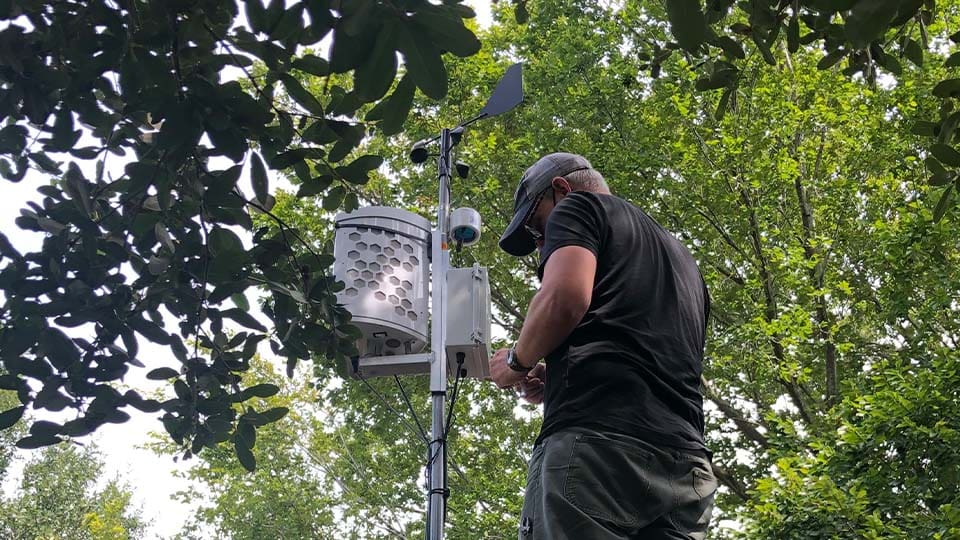
Community Air Monitoring Network (C.A.M.P.)
To inform county air monitoring, we have built our own community-based air monitoring network. We currently have air monitors in Pasadena and Galena Park/Jacinto City, three of Houston’s ‘Complete Communities’: Kashmere Gardens, Gulfton, and Near Northside/Northline, and we’re expanding our network to Baytown, Channeview, and Northeast Houston.
This low-cost network is being designed to address neighborhood-level air quality concerns in communities with the greatest risks. It comprises a mix of air monitors in strategic locations, including Purple Air brand particulate matter monitors and Sensit brand air monitors that detect common pollutants.
This additional air monitoring capacity is helping us identify and raise awareness about air pollution sources in neighborhoods most impacted by poor air quality. Equally importantly, it guides community action planning around issues of concern.
Check out our air monitoring dashboards to view our current Community Air Monitoring Network and monitor air quality in your community.
Community partners who make it possible to maintain our network:
Jacinto City Hall, Galena Park Multiservices, Environmental Community Advocates of Galena Park (ECAGP), Natural Health Care Massage, St. Peter’s Epsicopal Church, Launch Point CC, St. Catherine’s School, Westward Square Apartments
Air Quality Ambassadors
Our Air Quality Ambassadors program gives residents the chance to learn about the technical aspects of air quality including map reading, types of air pollution, and the air monitors, while using their community connections to grow the network and spread information. Ambassadors receive stipends for attending and completing the training.
Current Ambassadors:
Jean Vega – Galena Park
Sandra Edwards – Kashmere Gardens
Presentations, data summaries, and action plans
We hold meetings with community members and partners to share results from our air monitoring network and then use this information to work together on community action plans for clean air. Our data presentations and community action plans can be found below.
We will upload our air monitoring data soon.
We will upload our air monitoring data soon.
We will upload our air monitoring data soon.
This part of our network is no longer active.
Environmental Protection for the 21st Century: Putting Equity at the Top of the Agenda – Community Air Monitoring Network Case Study – A Case Study of AAH CAMP by the American University Center for Environmental Policy
Air Alliance Houston comments on the TCEQ 2023 Draft Air Monitoring Network Plan (AMNP)
Sampling the City
Hyperlocal air pollution data can help residents and policymakers to better identify, remediate and prevent pollution sources and their associated health risks in communities.
Since 2020, we have partnered with Houston communities, including Sunnyside, Fifth Ward, OST-South Union, and the East End, to cruise their neighborhoods on bicycles with personal Flow 2 air quality monitors to bring attention to local air quality and pollution sources. The data collected during these rides have been insightful, and we are working on expanding this citizen-scientist research with a focus on additional environmental justice communities.
Our aim is to help empower residents with air pollution monitoring technology that will inform, educate, and help mobilize advocates to influence public policies that improve air quality —
ensuring clean air for all Houstonians.
Data Review: Gulfton (July 30, 2022)
Data Review: East End (November 20, 2021)
Data Review: Houston’s Sunnyside, OST- South Union and Fifth Ward Communities (June 5, 12, and 19 of 2021)
Data Review: Simms Bayou – Houston Botanic Gardens, East End – Second Ward, Greater Heights, Brays Bayou, Downtown, Sheldon, Spring Creek Greenway (December 5, 2020)
Advancing Climate Justice
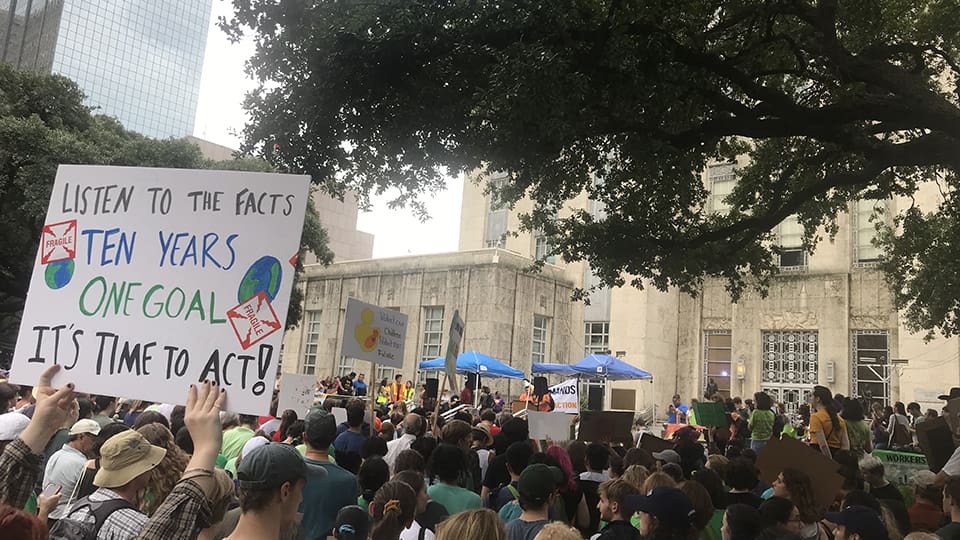
Beyond Coal: WA Parish Power Plant
We work alongside the community via grassroots organizing against NRG Energy’s W.A. Parish coal-fired power plant in Fort Bend County – one of the state’s worst climate polluters. Our team of coordinators is surveying the community to gather testimony and provide education about the dangers of having this health-harming pollution in our own backyard. Our goal is to help shut down the W.A. Parish plant in order to advance our mission for clean air.
Report: Close Parish Coal: How the Dirtiest Coal Plant in Texas Harms Public Health and the Environment; and the Alternatives for Fort Bend | Cierre de la Planta de carbón de Parish: Los perjuicios que la central de carbón más sucia de Texas cause en la salud publica y el medio ambiente y las alternativas para Fort Bend. Air Alliance Houston, July 2023
Decarbonization
New technologies and emissions reduction strategies have emerged to address the issue of carbon-driven climate change. We recognize that different strategies must be employed to achieve global climate goals. Our climate team is analyzing comprehensive decarbonization strategies and their impacts for the region including but not limited to technological responses such as Carbon Capture Utilization, and Storage (CCUS).
CCUS is a highly technical subject that only a handful of high-level interest groups (city, industry, and university cliques) are familiar with, often leaving those at risk out of the conversation. We want to involve environmental justice communities in these discussions and look critically at the role of CCUS in decarbonization strategies today, so that community remains at the center of a decarbonization future.
Report: Perspectives on Carbon Capture Technology in Houston: A Qualitative Assessment and a Path Forward | Perspectivas sobre la tecnología de capture de carbono en Houston: Evaluación cualitativa y possible camino hacia el futuro
Air Alliance Houston, June 2023
Summary Sheet: What Houstonians Need to Know About Carbon Capture | Ficha resumen: Lo que los residentes de Houston deben saber sobre la captura de carbono
Local and regional climate action planning
We proudly supported the City of Houston in the creation of its first-ever Climate Action Plan (CAP). After co-leading the transportation working group for the CAP, we are now advocating for the codification of the plan and accelerated implementation of its strategies. Alongside City of Houston climate action planning, we are also supportive of Harris County’s movement towards a county-level plan. In addition, we are working with diverse partners to create new frameworks, legislative agendas, and plans for addressing the intersections of air quality, climate, equity, and energy.
Opposing chemical plastic recycling
Chemical Recycling or “Advanced Recycling” refers to a group of processes that use heat or chemicals to break plastic down into micro-components that can be theoretically used in recycled plastic items or converted into fuel.
Instead of reducing single-use plastics, the petrochemical industry seeks to use this technology to make fuel and additional plastic to enhance their public image and sustain their market hold. However, the mixed plastics used in these processes are of lower quality and contain higher levels of toxins. Moreover, the cost of manufacturing additional plastics from this source far exceeds that of producing fresh plastics, making the method economically unviable. Similarly, to make fuel from plastic feedstock requires a lot of energy and the process emits toxic chemicals into the air, including chemicals known to cause cancer. Despite industry efforts to market this fuel as “sustainable,” it is, in fact, toxic and energy-intensive.
We are working with community members primarily in Baytown, Galena Park, and Pasadena, where these new plastic “recycling” or “sustainable” fuel facilities are located, to raise awareness of this false solution and to urge decision-makers to reject industrial air pollution.
Mobilizing for Environmental Justice
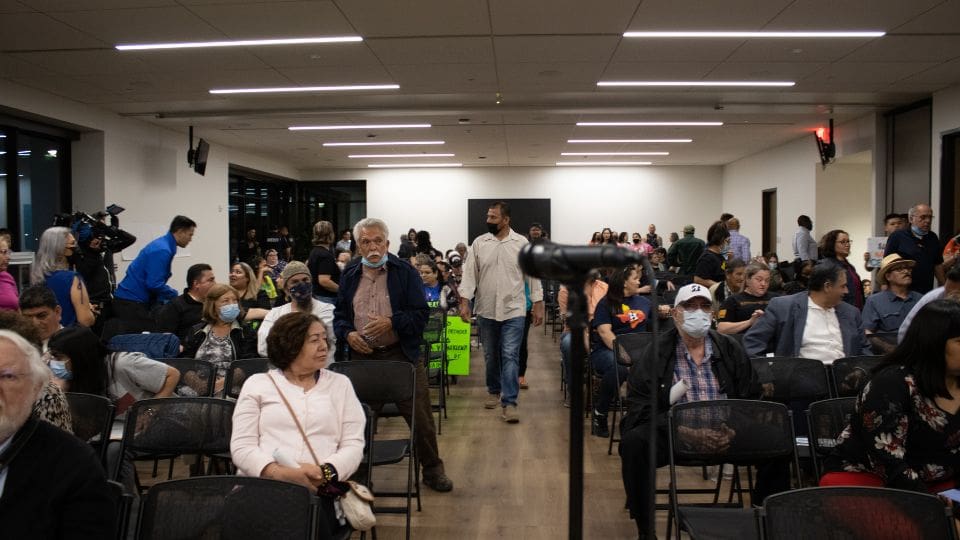
Environmental Justice Leadership Lab (EJLL)
This is a community-centered approach to tackling environmental justice issues related to air quality. The EJLL is for community members and leaders who want to increase their understanding of the various environmental agencies responsible for air quality and access resources for advocating for clean air in the Houston area.
Language Justice
Comprehensive language access plans, especially in agencies like the TCEQ (Texas Commission on Environmental Quality), are crucial for fostering diverse community engagement. Without such access, many members of the community are excluded from providing comments, attending public hearings, and engaging with government agencies. AAH is in collaboration with Tecolotl, Woori Juntos, and other organizations to further strengthen the effort to promote language access and ensure that all voices in Harris County are heard.
If you are needing interpretation help, please contact Genesis Granados at genesis@airalliancehouston.org
Reproductive Justice
AAH understands reproductive justice as “the human right to maintain personal bodily autonomy, have children, not have children, and parent the children we have in safe and sustainable communities” (SisterSong). We recognize that environmental injustices are inherently tied to the ability of individuals to exercise their reproductive rights and autonomy, especially after the Dobbs decision in 2022.
Air Alliance Houston’s involvement in the Promote Environmental Justice working group of the Mom and Baby Action Network (M-BAN) reflects our commitment to addressing environmental justice issues that affect maternal and infant health.
Past Campaigns
Metal Air Pollution Partnership Solutions (MAPPS)
Air Alliance Houston partnered with UTHealth on a 5-year collaborative research-to-action project to study and address potential health risks associated with air emissions from metal recycling facilities in Houston.
Metal recycling facilities accept and process scrap metals. The benefits of metal recycling over the use of raw materials include energy savings the conservation of resources, and job creation. Yet, some recycling plants in Houston are in close proximity to residential neighborhoods, raising concerns about exposure to dust and harmful metals that can be emitted during the recycling process.
Metal Air Pollution Partnership Solutions (MAPPS) was a a 5-year collaborative research-to-action project to study and address potential health risks associated with air emissions from metal recycling facilities in Houston. We partnered on this project with UTHealth School of Public Health, the Houston Health Department Bureau of Pollution Control and Prevention and Rice University, working collaboratively with metal recycling industry representatives and neighborhood residents.
The project found increased cancer and respiratory risks in the study areas. As a result, participating recylers have started adopting the recommendations of the project and taking steps to mitigate metal air pollution emissions.
Read about the findings on this website.
Ozone Theater: Setting the Stage for Air Pollution Education
Air Alliance Houston partnered with UTHealth on a 5-year collaborative research-to-action project to study and address potential health risks associated with air emissions from metal recycling facilities in Houston.
We believe it’s never too early to teach children about the importance of clean air.
For almost 20 years, from the late 1990s through 2019, Air Alliance Houston (previously Mothers for Clean Air) offered free air pollution and health education lessons for elementary and middle school students.
“Ozone Theater,” developed in partnership with the University of Texas Medical Branch, was an educational program that used interactive theatrical games and hands-on activities to educate students about ozone air pollution, a major problem in the Houston area.
The idea was to make children aware of the causes and health effects of ground-level ozone in a fun, lively, and interesting way.
Three age-appropriate curricula were aligned to the Texas Essential Knowledge and Skills (TEKS) objectives in science, health, language arts, and fine arts.
Drama-Based Education
Ozone Theater used a drama-based educational approach, which employs theater techniques to get students moving around the classroom and actively engaging with the material that they’re learning.
This type of teaching creates equal learning opportunities for all kinds of learners regardless of age, race, language, and learning style. In addition, studies have shown that the use of drama-based education motivates students to be more excited about learning and improves information retention as proven by increased test scores.
Ozone Theater teaching artists employed pre- and post-tests to demonstrate the learning involved in the program, and teachers evaluated each workshop to ensure the persistence of quality.
Curriculum
PESKY POLLUTERS
In “Pesky Polluters,” Kindergarten through second grade students were introduced to the concept of air pollution, and the difference between clean air and dirty air. They acted out various sources of air pollution such as a bus, a car, a plane, a factory, or a gas station.

GOOD OZONE, BAD OZONE
In “Good Ozone, Bad Ozone,” third through fifth graders learned the difference between the ozone layer and ground-level ozone. They were introduced to the federal government’s Air Quality Index and they acted out appropriate, safe activities for times of elevated ground-level ozone.

AIR POLLUTION SOLUTIONS
In “Air Pollution Solutions,” middle school students learned the basic facts of air pollution: what it is, where it comes from, and what they can do about it. Students were led through an improvisational drama in which they acted out possible solutions to ozone exposure during sports practice and diesel emissions from idling school buses.
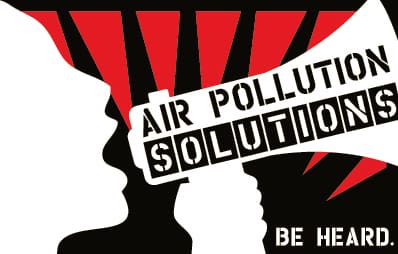
Awards
Ozone Theater received numerous awards, including:
- The Clean Air Excellence Award from the U.S. Environmental Protection Agency.
- The President’s Cabinet Award from University of Texas Medical Branch.
- A Mayor’s Proud Partner Certificate of Recognition from the City of Houston.
Educator testimonies
- “After school, as we were waiting for parents to pick students up, I heard a couple of kids talk about the bus’s tail pipe and pollution. I think they got it.” – Houston ISD Elementary School Teacher
- “We had fun learning from the leader’s positive, innovative techniques. The students did gain new knowledge and the bookmarks they received from the presenter were an added treat! Thank you for arranging this wonderful program.” – Elementary Environmental Educator at Environmental Institute of Houston-Clear Lake
- “I love all the actions and movements. Great for young children! The students were very engaged. The Teaching Artist was very energetic and patient with the kids. I learned a lot too!” – Humble ISD Elementary School Teacher
- “Very informative, and the children were interested and engaged. It’s a great lead-in for our Science Fair project.” – Houston ISD Elementary School Teacher
- “My teachers were impressed, and they’re a tough group to impress.” – Pasadena ISD Science Curriculum Manager
Due to limited resources and a re-focusing of our organizational strategic objectives towards a greater emphasis on community engagement and impacting legislative change, the Ozone Theater program was discontinued in 2019.
“Houston Give 5” campaign kicks off Earth Month at Ruggles Green at City Centre
March 26, 2014, Houston Chronicle
HOUSTON INDEPENDENT SCHOOL DISTRICT CELEBRATES ASTHMA AWARENESS MONTH
May 24, 2011, Asthma Community Network
Theater Teaches The Science Of Clean Air
Moms Clean Air Force, May 1, 2012
Earth Day Festival and Art Contest
Between 2004 and 2016, Air Alliance Houston (previously Mothers for Clean Air) hosted the city’s largest annual Earth Day celebration.
Each year in April, this family-friendly festival brings together hundreds of environmental and health entities who provide a day of free entertainment for thousands of Houstonians of all ages. The activities organized seek to raise environmental awareness and influence the way Houston residents think and live with respect to the environment.


In 2007, an annual Earth Day Art Contest was initiated by Air Alliance Houston to inspire Houston area students to express what they envision when they think of a sustainable future with clean air, water, and land. The contest was open to all students in 3rd-12th grade. Winning artwork was showcased on a prominent tour of Houston before being sold at auction; proceeds benefited the winning schools’ art departments and Air Alliance Houston’s educational programs.
In 2016, we passed on the organization and execution of the Earth Day Houston to the Citizens’ Environmental Coalition in order to focus our scarce resources on our core mission of reducing air pollution and protecting public health in the Houston region.
Earth Day is one of the most widely celebrated environmental events across the globe. It is celebrated each year on April 22 with specific activities in support of the environment arranged worldwide in over 190 countries.
Eight local nonprofits ask Houstonians to support the environment on Saturday
Houston Chronicle, April 24, 2014
Earth Day Houston celebrates environment with day-long free events
The Leader News, April 10, 2014
“Houston Give 5” campaign kicks off Earth Month at Ruggles Green at City Centre
Houston Chronicle, March 26, 2014
Gilmore students compete
Houston Chronicle, March 27, 2012
Olympia student wins Earth Day Art competition
Houston Chronicle, March 20, 2012
Local art students reach competition finals
Houston Chronicle, March 16, 2012
Bridge to Clean Air
In 2015, Air Alliance Houston teamed up with Rice University to study air pollution levels at the Hazard Street bridge at U.S. 59 – a Houston traffic hotspot that borders a residential neighborhood.
The project, named “Bridge to Clean Air”, studied air pollution levels at the Hazard Street bridge at U.S. 59 – a Houston traffic hotspot that borders a residential neighborhood.
The aim of the project was to raise awareness about air pollution along busy highways more generally and at the selected location more specifically, and ultimately to reduce it. The project also aimed to demonstrate that air pollution is not just a problem for those living near refineries, but that all Houstonians are at risk for breathing harmful air pollution.
With the help of monitoring equipment from the City of Houston, a group of Rice University students gathered air samples during morning and afternoon rush hours over several months in spring 2016.
Using statistical analyses, the team examined levels of fine particulate matter and nitrogen dioxide, air pollutants that have been linked to increased risk of cardiac arrest and asthma attacks in Houston.
The results showed notably high concentrations of both pollutants at the bridge site: More than 25 percent of the hourly measurements of fine particulate matter were high relative to the 24-hour national air quality standards. The concentrations were also higher than those at locations that routinely monitor for fine particulates in other parts of the city. The most elevated and troublesome concentrations occurred during the morning sampling periods.
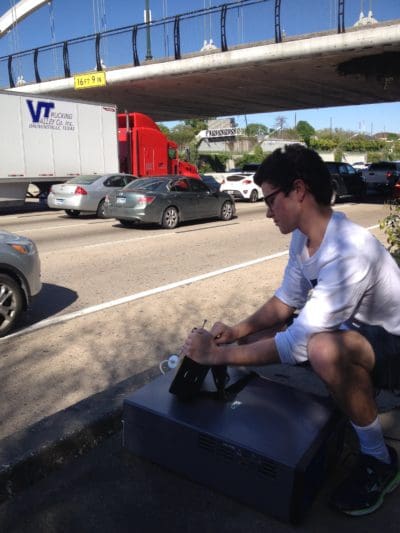
Based on these findings, the project recommended installing equipment near the site to remove fine particulate matter and nitrogen dioxide from the air. The results also highlighted that additional air pollution monitoring should be undertaken along Houston highways, especially segments that are adjacent to residential areas.
The findings were shared with the Houston Health Department and the Environmental Protection Agency.
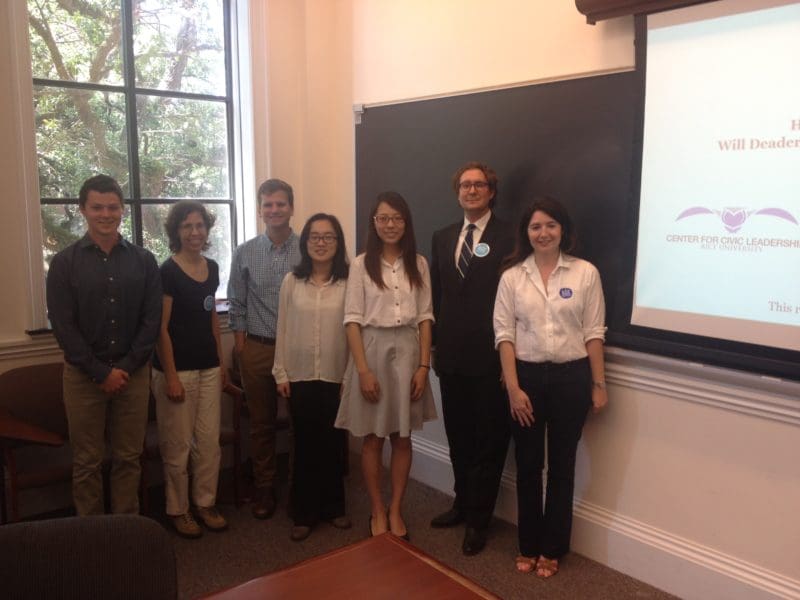
Following the analysis, the students worked toward the installation of a system that would use a smart city lighting technology to inform road-users in real-time about air pollution levels. However, implementing the lighting scheme with the bridge lights was deemed unfeasible by TxDOT due to driver safety concerns.
The Bridge to Clean Air project was a collaboration between the Rice University’s Center for Civic Leadership and Air Alliance Houston, the City of Houston Health Department, Houston Wilderness, and supported by a grant from the Baxter Trust.
Building a bridge to clean air in Houston
Rice university News, July 27, 2016
Study: Air pollution at ‘dangerous’ levels along Southwest Freeway
KHOU 11, May 11, 2016
Bridge to Clean Air Final Report (Final Report), May 31, 2016
Anti-Idling Ordinances
Air Alliance Houston led several campaigns to build support for anti-idling ordinances in the cities of Houston, Galena Park and Jacinto City.
Vehicle idling wastes fuel and emits toxic air pollutants that can harm cardiovascular and respiratory health, and even cause cancer and premature death. Children, the elderly and those with asthma and other chronic health problems are particularly vulnerable to the health dangers of exhaust.
In the Houston region, and in the Ship Channel Communities in particular, engine idling by freight trucks serving the busy Port of Houston and diesel-run school buses cause a lot of unnecessary pollution.
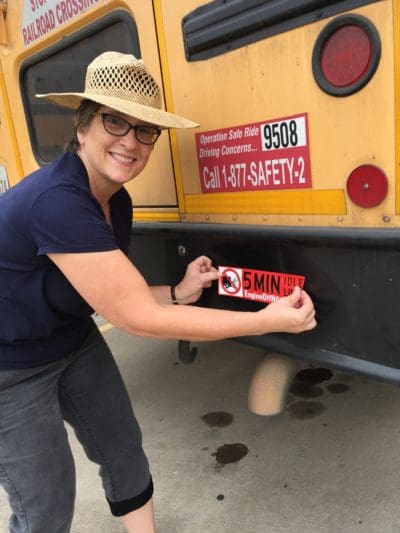
To address this pollution source, Air Alliance Houston led several campaigns over the past few years to build support for anti-idling ordinances in the cities of Houston, Galena Park and Jacinto City, as idling restrictions have proven simple and effective measures to improve urban air quality.
As a result of persistent campaigning efforts, all three cities passed anti-idling ordinances between 2014 and 2017. The ordinances apply to most heavy-duty diesel vehicles, including school buses. These vehicles cannot idle their engines for more than five minutes at a time.

We also teamed up with the Houston Independent School District (HISD) and the City of Houston to spread the word about Houston’s vehicle idling policy by placing “Engine Off” bumper stickers on HISD’s fleet of school buses to help remind our bus drivers and others about the law.
Bus bumper stickers warn against idling
Houston Chronicle, October 12, 2016
Houston’s ozone level improves, but still poor
KHOU 11, September 14, 2016
No idling, please
Houston Chronicle, November 9, 2015
Houston council approves anti-idling law
Houston Chronicle, November 4, 2015
Air Pollution and Public Health in Galena Park
In 2013, Air Alliance Houston initiated a community air monitoring project at Galena Park. The project included a community health impact survey, mapping workshops, and community air monitoring activities.
Galena Park, Texas, is an environmental justice community of some 10,000 residents on the Houston Ship Channel. It is a community in which concerns about pollution and public health run high due to its proximity to the petrochemical industry, freight rail lines, and high traffic roadways. The city’s main road, Clinton Drive, is used by heavy-duty vehicles hauling freight to and from the Port of Houston.
However, a lack of resources and knowledge leads to very little public engagement on issues that impact environmental quality and health. Although citizens are worried about their health, there is little sense that they can personally affect change.
In 2013, Air Alliance Houston, in partnership with Global Community Monitor, initiated a community air monitoring project at Galena Park. The project included a community health impact survey, mapping workshops, and community air monitoring activities.

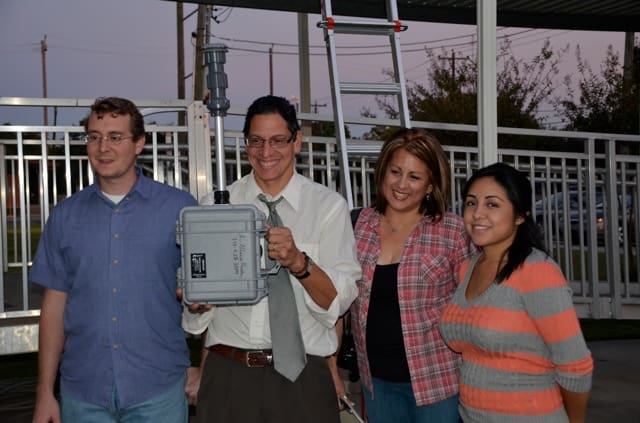
Air monitoring was conducted over the course of a year for fine particulate matter and elemental carbon, a surrogate for diesel pollution. An independent report was produced by a graduate student at the Rice University Department of Statistics.
The results showed that diesel pollution presents an unacceptable health risk in Galena Park. Cancer risk due to diesel pollution exposure may exceed 1 in 10,000, while many scientists and health professionals consider an acceptable cancer risk to be one additional cancer case in one million people. Fine particulate matter pollution may exceed federal health standards as well.
The report recommended that Galena Park take immediate action to reduce diesel and particulate matter pollution in order to protect its residents’ health. Our suggestions included taking aggressive steps to limit diesel pollution by banning older, dirty trucks and diverting trucks from Galena Park roads. Another suggestion was for Galena Park to enforce a city ordinance that would restrict heavy-duty trucks from idling for more than five minutes at a time. We also recommended further testing to determine the extent of air pollution in Galena Park and its impacts.

The results of the project helped bolster advocacy efforts to implement an anti-idling ordinance in Galena Park later in the year. Similar ordinances were subsequently passed in the cities of Houston and Jacinto City.
Cancer risk from diesel in Galena Park
Houston Chronicle, July 8, 2014
Pollution From Ship Channel and Port Traffic Affects Galena Park
State Impact, July 8, 2014
GALENA PARK: Air quality report cites health dangers
North Channel Star, July 23, 2014
Air Pollution and Public Health in Galena Park (Report July 2014)
